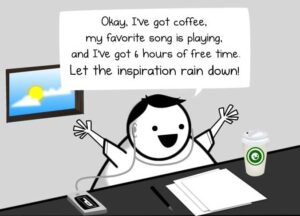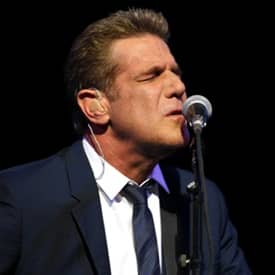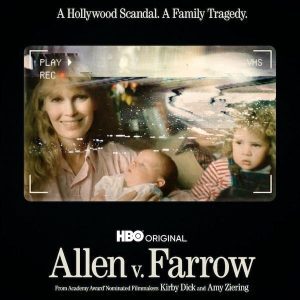 I’m a big fan of mixing with other creative fields that are parallel to my own. When I moved to Los Angeles, I found myself surrounded by actors, writers, directors, editors…all people who work in creative fields that are parallel to mine. Even if their work is entirely different, many principles from one discipline can bring to light helpful techniques in others. I’m an avid reader of Ken Levine’s writers blog. Ken is an Emmy-winning writer, director, and producer, and he’s worked in the industry for more than 30 years on shows such as MASH, Cheers, The Simpson, Wings, Everybody Loves Raymond, Becker, Dharma & Greg, and Almost Perfect. One of his posts, entitled Meet the Creators of The Good Wife, included a great set of tips that Ken culled from a WGA seminar that featured the writers of The Good Wife, and as I read it, I saw numerous parallels that struck me as important in the life of a musician-songwriter. So here, inspired by Ken Levine, who was inspired by Michelle & Robert King of The Good Wife, are Seven Tips to Songwriting Greatness.
I’m a big fan of mixing with other creative fields that are parallel to my own. When I moved to Los Angeles, I found myself surrounded by actors, writers, directors, editors…all people who work in creative fields that are parallel to mine. Even if their work is entirely different, many principles from one discipline can bring to light helpful techniques in others. I’m an avid reader of Ken Levine’s writers blog. Ken is an Emmy-winning writer, director, and producer, and he’s worked in the industry for more than 30 years on shows such as MASH, Cheers, The Simpson, Wings, Everybody Loves Raymond, Becker, Dharma & Greg, and Almost Perfect. One of his posts, entitled Meet the Creators of The Good Wife, included a great set of tips that Ken culled from a WGA seminar that featured the writers of The Good Wife, and as I read it, I saw numerous parallels that struck me as important in the life of a musician-songwriter. So here, inspired by Ken Levine, who was inspired by Michelle & Robert King of The Good Wife, are Seven Tips to Songwriting Greatness.
1. Always be looking to do something that hasn’t been done. Avoid clichés and formulas. The world’s one millionth 1-5-6-4 chord song is unlikely to get anyone’s attention unless you bring something genuinely new and fresh to it. Find lyric rhymes that aren’t predictable. Work your melodies and rhythms to sculpt phrases that take the listener somewhere they haven’t been before.
2. Start each song with something unexpected. What hasn’t been done before? What will grab the listener’s ear from the very first note? Do you need an 8-measure intro? Can it be 4? Can it be 2? Can it be zero? If an intro is necessary, are there any better ideas other the predictable device of using the chords that go under the first section? Can you use an unusual instrument? Can you come up with an unusual riff then relate it back to the rest of the song? Find a way for your intro to grab someone’s attention and let them know something unique is about to unfold.
 3. Don’t hold back good ideas. If you have several good ideas, don’t be stingy and save them for future songs. If they work together and belong together, put them into this song. Other good ideas will come for future songs. I love what the Oatmeal says about the creative process in this lengthy but worthwhile cartoon (caution: adult language). If you are a healthy writer, ideas will continue to flow whether this is your first song or your thousandth.
3. Don’t hold back good ideas. If you have several good ideas, don’t be stingy and save them for future songs. If they work together and belong together, put them into this song. Other good ideas will come for future songs. I love what the Oatmeal says about the creative process in this lengthy but worthwhile cartoon (caution: adult language). If you are a healthy writer, ideas will continue to flow whether this is your first song or your thousandth.
4. Take a workmanlike approach. Write every day if you can. Don’t get hung up on making everything perfect. I’d rather write twenty songs that reflect various experiences or storylines, then be able to look back and see what’s unique about each, rather than write one and feel like every single aspect of it has to be perfect, and never finish it because I can never find perfection.
5. Make sure each part of the song moves the story forward. Don’t be satisfied by filler. Is there a reason for the bridge? If not, you might not need a bridge. Do the verses support and explain the chorus? If not, your song may not be as strong as it should be. Try moving the second verse and put it in the place of the first verse. Does the song still make sense? If yes, then by definition, the second verse may be redundant, because you haven’t moved the story forward. Do you enjoy the story you’re writing? If not, why are you writing it?
6. Listen to other people’s songs. Study them, enjoy them, surround yourself with them, and let yourself marinate in them. It’s not homework. If you are dedicated to your craft of songwriting, this should be something you enjoy doing. Go read some songblogs to force your mind to think on the micro level.
7. Take chances. Try new things. Try chord combinations you haven’t tried before. Try reversing chorus and verse. Try half-time and double-time. Try different tempos. Try your song in any kinds of guises until you find the best fit for it.
 Finally, have a read of this entertaining anecdote from Steven Pressfield, who tells the story of the Eagles’ Glenn Frey, who learned a vitally important secret of songwriting from Don Henley, who, by pure chance, lived one floor below him in the early 70’s when they had first moved to Los Angeles and hadn’t found any success yet. The story is called Jackson Browne’s Piano Coming Through the Floor.
Finally, have a read of this entertaining anecdote from Steven Pressfield, who tells the story of the Eagles’ Glenn Frey, who learned a vitally important secret of songwriting from Don Henley, who, by pure chance, lived one floor below him in the early 70’s when they had first moved to Los Angeles and hadn’t found any success yet. The story is called Jackson Browne’s Piano Coming Through the Floor.
Want more? See my tips on overcoming songwriter’s block.





















